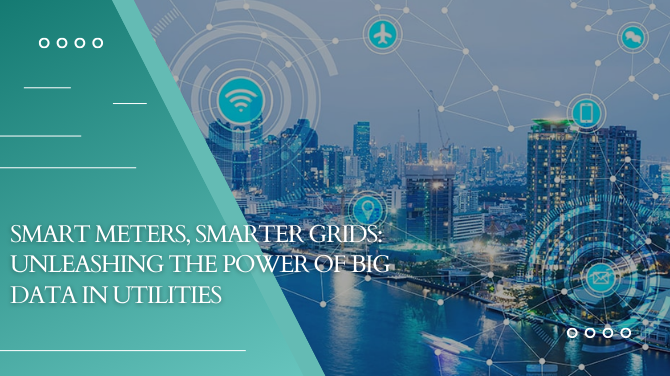Smart Meters, Smarter Grids: Unleashing the Power of Big Data in Utilities

January 17, 2024
 2101
2101
In an era dominated by technological advancements, the utility sector is undergoing a transformative shift towards smart grids and intelligent energy management. One of the key drivers behind this transformation is the integration of smart meters and the utilization of big data. This synergy is unlocking unprecedented opportunities for efficiency, sustainability, and improved consumer engagement in the utilities industry.
- The Rise of Smart Meters:
Smart meters are the cornerstone of the modern utility landscape, replacing traditional analog meters with digital devices that provide real-time data on energy consumption. Unlike their predecessors, smart meters offer two-way communication, enabling seamless interaction between utilities and consumers. This constant flow of data forms the foundation for building smarter grids.
- The Power of Big Data:
The true magic happens when this continuous stream of information is processed and analyzed using big data analytics. Big data technologies empower utilities to gain deep insights into energy consumption patterns, voltage fluctuations, and other crucial parameters. This wealth of information allows for precise monitoring, forecasting, and optimization of the entire energy distribution network.
- Efficiency and Sustainability:
Smart grids, fueled by big data analytics, enable utilities to optimize energy distribution in real-time. This leads to improved operational efficiency, reduced energy wastage, and lower maintenance costs. Additionally, the ability to detect and address faults promptly enhances overall system reliability. The result is a more sustainable and resilient energy infrastructure.
- Empowering Consumers:
Smart meters empower consumers by providing them with detailed information about their energy usage. This newfound transparency fosters an environment of energy awareness and conservation. Consumers can monitor their consumption patterns, identify energy-hungry appliances, and make informed decisions to reduce their carbon footprint. Incentive programs and dynamic pricing models encourage users to shift their energy usage to non-peak hours, further contributing to a more balanced and sustainable grid.
- Predictive Maintenance:
The integration of big data analytics allows utilities to move from reactive to proactive maintenance strategies. By analyzing historical data and predicting potential equipment failures, utilities can schedule maintenance activities more efficiently, reducing downtime and improving overall system reliability. This predictive approach not only saves costs but also enhances the lifespan of grid components.
- Challenges and Considerations:
While the benefits of smart meters and big data in utilities are substantial, it's crucial to address potential challenges. Privacy concerns, data security, and the need for standardized protocols are some of the hurdles that must be navigated to ensure the successful deployment of these technologies.
Conclusion:
The fusion of smart meters and big data is reshaping the utilities landscape, propelling it towards a future marked by efficiency, sustainability, and consumer empowerment. As we continue to unlock the full potential of these technologies, the smart grid will evolve into a dynamic, responsive, and interconnected system, revolutionizing the way we generate, distribute, and consume energy. Embracing this transformation is not just a leap forward for the utilities sector; it's a giant stride towards a more sustainable and intelligent energy future.